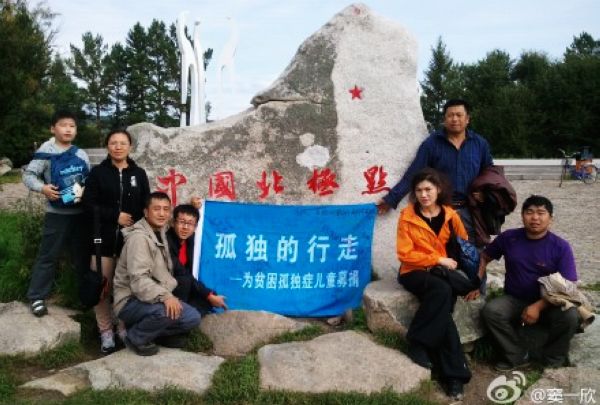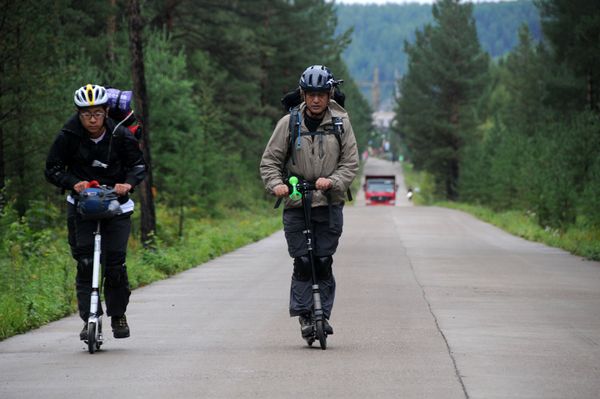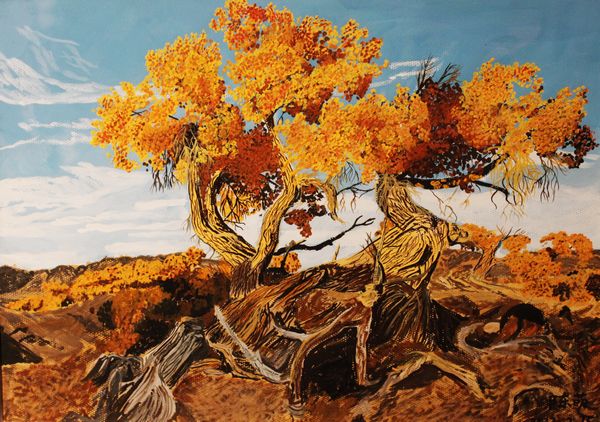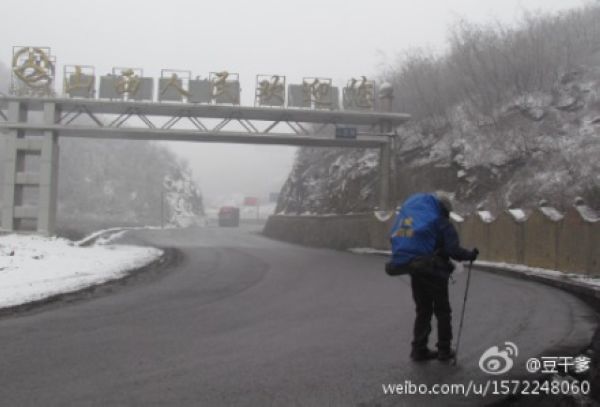Crossing China for autism
- By Zhang Junmian
 0 Comment(s)
0 Comment(s) Print
Print E-mail China.org.cn, August 27, 2012
E-mail China.org.cn, August 27, 2012
Dou Yixin, a 49-year-old Beijinger dubbed the "Uncle of Autistic Children", together with an autistic boy Chen Meng, arrived at China's northernmost point, Mohe Village, on August 23.
|
|
|
Dou Yixin (3rd from left), a 49-year-old Beijinger dubbed "Uncle Dou of Autistic Children", together with the autistic boy Chen Meng (4th from left), arrived at China's northernmost point, Mohe Village, on August 23. [Photo by Dou Yixin] |
The village, also known as the Arctic Village, lies in Mohei County of China's northeastern Heilongjiang Province, on the southern bank of the Heilongjiang River- also the border with Russia.
Then?on August 25, the two adventurers?set out on an incredible journey-walking some7,000 kilometers across China- with the aid of kick scooter, until they reach Hainan's Tianya Haijiao (literally the end of seas and skies) after some129 days. Tianya Haijiao is considered China's southernmost point. Along their journey from north to south, they will cross a total of 10 provinces, including Heilongjiang, Jilin, Liaoning, Hebei, Shandong, Henan, Hubei, Hunan, Guangdong and Hainan.
During this period, promising young artist Chen Meng will sketch the local natural scenery, despite the fact that he is suffering from autism. Autism is a lifelong disability caused by a neural development disorder that seriously affects the way somebody communicates with and relates to others.
|
|
|
Chen Meng, a 20-year-old autistic boy from Gansu, is sketching the natural scenery of a village in Russia's Amur Oblast region, located right across the Heilongjiang River. [Photo by Dou Yixin] |
It shall be a challenging and long march for sure, but Dou thinks he is well-prepared for any mishap that might occur, expected or not. He said: "I believe it is worthwhile doing this, simply for the sake of all autistic children."
Talking about the aim of his long trek, Dou said: "I simply hope that people can know more about the disorder and show more concern towards it. They can then do something for the poor families with autistic children. Such families are living rough lives."
|
|
|
Dou Yixin (right), a 49-year-old Beijinger dubbed "Uncle Dou of Autistic Children", and autistic boy Chen Meng start a journey of 7,000 kilometers on foot in aid of autistic children on Aug. 25, 2012. [Xinhua] |
Dou, director of the non-profit Jintian Autism Rehabilitation Training Center in Lixian Town, Daxing District of Beijing, was recently forced to close his school's doors due to financial pressures. Dou said: "All teachers were dismissed, and the five orphan autistic children we had raised, including twin boys, were sent back to the local welfare institute."
Dou admitted that his quality of life has been severely influenced as he put too much time and money into his charitable undertaking, but he has never felt regret as the task drastically changed his outlook on life and society. He was once a businessman who thought all people are hypocrites and money-grabbing wolves. Yet after he unexpectedly came into contact with autistic children four years ago, he felt he needs to do something for them. And so he did.
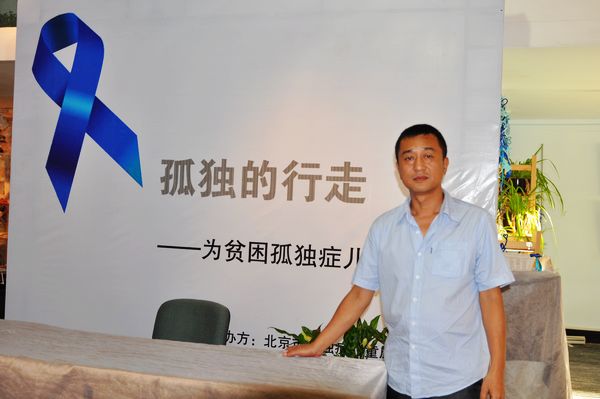 |
|
On August 29, Dou Yixin, a 49-year-old Beijinger, will embark on an incredible journey by walking 7,000 kilometers across China, from the nation's northernmost Mohe down to Sanya in the south. [Photo by Zhang Junmian/China.org.cn] |
Dou said: "I was probably trying to find something that would move and shake me to the core since I had myself in the vanity of society completely. However, one year after I started Jintian, I found I got more from the autistic children, who taught me the power of love and kindness. I will never forget the great joy arising from within myself the first time I saw an autistic boy, who had never uttered a word in his life, opening his mouth and said "Mama" during class. Another boy, who was quite volatile and used to hit people and smash things, became much gentler after his three-month treatment."
With?some help from the local autism rehabilitation organizations and volunteers sent out by the U.S.-based international non-profit Student In Free Enterprise (SIFE) team at the Tianjin University of Finance and Economics, Dou planned to distribute information on autism and useful tips on how to stay in touch with autistic children.
|
|
|
"Poplars," by Chen Meng, a 20-year-old autistic boy from Gansu province [Photo by Zhang Junmian/China.org.cn] |
Dou now hopes his walking challenge will, over the course of one year, raise several million yuan in rehabilitation funds in order to support the further development of one hundred autistic children nationwide. Dou said: "All the money we raise, will go into an account especially set up for autistic children by China Social Welfare Education Foundation. The information of children receiving donations, as well as regular updates on their overall progress, will be disclosed online."
Currently, rehabilitative treatment will typically cost a family between 15,000 and 30,000 yuan (US$2,381-4,762) per year in China. Many families are forced to discontinue such treatments due to high costs and a severe lack of rehabilitation facilities. About 80 percent of autistic children are not taking part in specially designed therapy. The country currently counts over 10 million autism sufferers and this number is gradually increasing.
Dou said: "Everywhere I stop, I will record the lives of the teachers engaging in special education, as well as the current situation of families with autistic children. I will do so either on video or through words."
Upon his return to Beijing early next year, Dou plans to write a report based on his experiences while walking, hoping that it could spark interest from the government, relevant organizations and the public. He also hoped all social services can combine forces in order to find out how to effectively help autistic children. Dou continued: "I just want to find out how much my actions can mean for autistic children and I will keep striving to get them more help."
In fact, this is Dou's second walking plan. In mid- February of this year, he embarked on a lonely walk from Beijing to Tibet, a journey that would have seen him cover about 4,300 kilometers over a time span of 8 months. Yet Dou was forced to abandon his trek when he had travelled some 1,600 kilometers. He had to return to Beijing to deal with several changes in the management of his Jintian center, as his major partner Tian Zhongmin, exhausted both financially and mentally, decided to throw in the towel.
|
|
|
In mid- February of this year, Dou Yixin began his lonely walk from Beijing to Tibet, a journey that would see him cover about 4,300 kilometers over a period of 8 months. [Photo by Dou Yixin] |
Dou said: "I need to do more in order to help people better understand autism, as I realized last time that there were still very few who knew about this syndrome." Dou also plans to complete his suspended Beijing-Tibet trek next year, and afterwards he will cross China from Shanghai in the east to Xinjiang in the northwest. "This way, I can cover the whole country to collect detailed and comprehensive statistics on autism with children. I will probably end up writing a book that tells the story of my own long march."
Dou and Tian founded the training center in 2008 with the aim to get more autistic children to take part in rehabilitative therapy. Over the past four years, they spent more than 4 million yuan (US$634,920), almost all of their personal savings. However, they realized it was nearly impossible to cover the high expenses needed to operate a non-profit organization of this kind.
Dou recalled: "Originally, we asked for some fees. But with poor families, we simply didn't have the heart to install that requirement. So we only charged nominal fees for children from poor families. We put in more money to stay in business and even built ten plastic greenhouses, planted vegetables and fruits for vending, all in the hope this could become a source of income for our school. However, we still found we were gradually losing control of the whole situation, as we only wanted to solely rely on ourselves."
Dou admitted that Jintian was a failure due to the shortage of funds and management expertise, yet he still cherishes the dream of developing a top-notch autism rehabilitation organization in China. "I feel very sad for having to shut its doors, but I'm sure that I will re-open it one day in the future," he said.
"Actually, what I dream of is to build a demonstrative community for autistic children, in which they can live much more productive lives while living, studying and working there," Dou said. "It doesn't need to be big; I just hope it can one day become a model for the entire nation to imitate."
Dou Yixin's Weibo: http://weibo.com/u/1572248060


